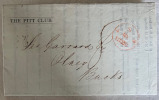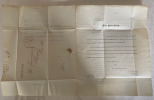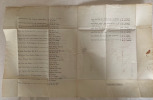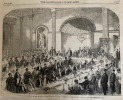London Tavern
Tree items of Ephemera. 1. A letter. 2. A table-plan. 3. An Illustration of a lavish Dinner.
ITEM 1. A general folded letter headed 'The Pitt Club' addressed to Tho. Olney, from A.D. Welch; Secretary, inviting him to the London Tavern for a General Meeting of the Club on Friday May 16th, 1828 to participate in a ballot for the 48 candidates named in the letter. The invitation is also for a celebration Dinner on the anniversary of Pitts birthday on May 28th. ITEM 2. An A3 sheet of strong paper showing an extremely well-designed table plan for an Inauguration Banquet at the Tavern on November 3rd, 1870. This table plan alone with its list of 40 titled people at the top-table, [see image # 2 below] gives a true first impression of the professionalism of the Tavern's organisation. ITEM 3. This is a wonderful Illustrated London News engraving dated Feb.12th 1859, of a complimentary dinner set-up for Mr Davis, The Huntsman of Her Majesties Staghounds at the London Tavern. All items housed in a marble papered folder.
- These items of ephemera, are interesting for two reasons. The London Tavern and its table settings and the historic Pitt Club, meeting there on May 3rd 1828. The Tavern was the most prestigious catering venue in London. (for a full description of the Tavern and its massive catering operation, see item # 11217, on this book-site.) The Pitt Club was apparently officially founded in Michaelmas term 1835, [although the letter here, irrefutably proves the club members were being nominated already in 1828.] and named in honour of the Prime Minister, from 1783 – January 1801 - William Pitt the Younger, who had previously been a student at Pembroke College, Cambridge. The Pitt Club was originally intended as one of many political clubs set up across Great Britain, 'to do honour to the name and memory of Mr William Pitt, and to uphold in general the political principles for which he stood'. In particular the University Pitt Club was intended to assist the local party organisations of the town of Cambridge to return worthy, that is to say, Tory, representatives to Parliament and to the Borough Council. From the start, however, there was a social element as the Club's political events were combined with 'the pleasures of social intercourse at dinner, when party fervour among friends, dining in party uniform, might be warmed towards a political incandescence by the speeches to successive toasts'. Over the course of the Pitt Club's first few decades, the political element diminished whilst the social element increased. By '1868, at the latest, the Pitt Club ceased from all political activity and elected members to its social advantages without any regards whatever to considerations of political party'. Though the Club's 'raison d'être' changed in its early years, it was from the first, and always remained, an undergraduate organization. The Pitt Club has been in almost continuous operation since its founding. During the First World War, however, the Club's existence became increasingly tenuous as more Cambridge men joined the forces. It temporarily closed in October 1917 but reopened in early 1919. By 1920, the Club had become, according to the Minutes; "nearly normal again, the only real trouble being the horrible scarcity of whisky". After the Second World War and they had to seek alternative accommodation, and eventually settled for rooms above the post office in Trinity Street, which they called the Interim Club. On 7 November 2017, a referendum to elect women into the club passed. This did not pass without controversy though, with only resident members being granted a vote. With ladies now elected, one imagines that the full maturation of the historical Pitt 'Social' Club's non-political activities progressed to everyone's full satisfaction. These are rare items of ephemera, especially the dating of the Pitt Club's activities in the letter. The other surprise also, is the London Tavern's high level of quality.






click on image to enlarge

category
ref number:
11319